This article came about as a request from the web development and design team, although the request wasn’t exactly to “write an article” about author pages. So, what did they ask me for?
It’s a time of renewal at MD Marketing Digital, and for the new blog that’s launching soon, the content for my author page was missing. And that means it’s time for the awkward moment of talking about yourself.
Looking for examples to see what other blog authors write on their pages and shape my own, I found a wide variety of examples and types of author pages, depending on the author’s field and expertise. That’s how this article came to be, to debut mine.
Author Pages and Their Relationship with E-E-A-T & YMYL
The first thing I ask myself is whether anyone actually reads author pages. Before working in SEO, I don’t think I did, and I’d bet that few of those reading this do either. But I do know “someone” who is interested in author pages, and that’s this corporation called Google, whose opinion matters a bit more than ours. But why are author pages important? The answer is simple: E-E-A-T.
As Tomás explained in his article about RaterHub, E-E-A-T is composed of four factors: expertise, experience, authoritativeness, and trustworthiness. Google’s ranking systems aim to reward original, high-quality content based on perceived E-E-A-T.
A concept closely tied to E-E-A-T is YMYL: Your Money, Your Life. YMYL topics include news, finance, shopping, fitness, health, and security—areas where trust in the author could directly affect someone’s physical or financial well-being.
How to Demonstrate E-E-A-T with Author Pages?
What would you do to demonstrate it in the real world? Would you look for your university diploma, print out a CV, or show your achievements or recognitions? That would be the right thing to do, so why not do it in the virtual world?
One of the ways any website can demonstrate E-E-A-T to Google is through author pages. Google pays a lot of attention to who wrote a piece of content and whether that person has enough experience or knowledge to publish on that topic.
But, as with almost everything in SEO, it depends. In this case, it depends on the topic each piece of content covers. It’s not the same for all websites or topics. For instance, we could write an article about our favorite video game or the best vacation spot without Google considering the author’s relevance. However, in YMYL topics, demonstrating E-E-A-T can be crucial.
Tips for Writing Author Pages that Demonstrate E-E-A-T
Before we analyze examples of author pages for different content themes, let’s take a minute to highlight key elements that cannot be missing from author pages:
- Write in the third person: If I make a quick count, 90% of the author pages I’ve seen are written in the third person. I understand that this is because it increases authority by conveying more professionalism than someone talking about themselves.
- Brief and concise biographies: Most of the examples we’ll see are relatively short. In some cases, they have fewer than 100 words, though YMYL topics might exceed 500 words.
- Information about the role or position: This adds credibility, as long as the author works in an area related to the article. Take an example: if I worked in finance, few people would trust what I write about SEO, and vice versa.
- Include background: I think all the examples agree on adding recent work experience in the area they write about, studies, certifications, and other related interests.
- Highlight trustworthiness: In YMYL topics, it’s essential to demonstrate that the author has the knowledge to write about those subjects, which may directly impact personal health and finances. For example, Dr. Andreas Eenfeldt attaches his diplomas and credentials in his bio.
- Publications and media appearances: Something that most authors agree on is highlighting their contributions to media, whether written or audiovisual.
- Social media and contact: Another way to demonstrate trustworthiness is to include links to LinkedIn and other social media platforms (as long as they are professionally focused). It’s also important to offer an email where readers can address their questions about the article.
- Include a professional photo: Shyness isn’t allowed on an author page. I didn’t find a single example to show that doesn’t include the author’s photo, and I think it makes sense—seeing the face behind the name that writes creates credibility by showing a real person.
15 Examples of Author Pages
Now that I’ve shared with you the key aspects of an author page and its impact on your site’s reputation, let’s explore some inspiring examples. Use them as a reference when creating yours.
Author Pages in Media
The New York Times
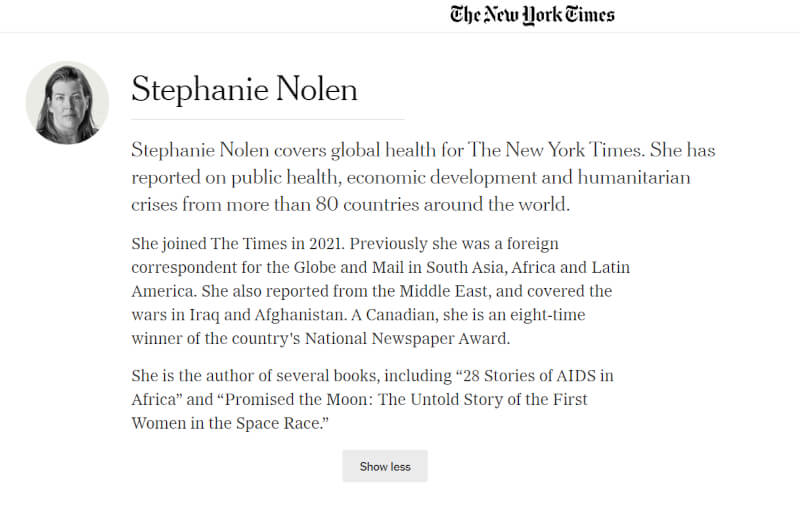
Since the author is a journalist covering global health, The New York Times highlights that Stephanie Nolen has reported on health-related news in over 80 countries. They also provide a brief overview of her career and notable publications.
Forbes

Forbes is one of the exceptions; the content is written in the first person. Additionally, they offer a page for each author and include a very brief summary in the article published by the writer, as we can see below:

NiemanLab
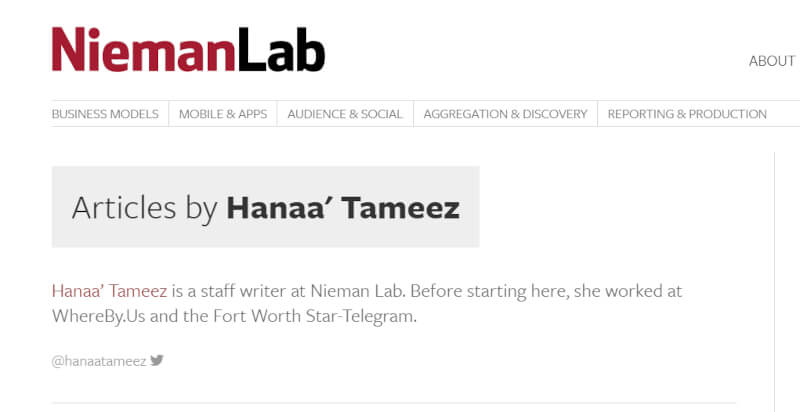
If we talk about short bios, NiemanLab is a great example. In fewer than 25 words, they describe the author’s background and provide a contact method.
The Cut
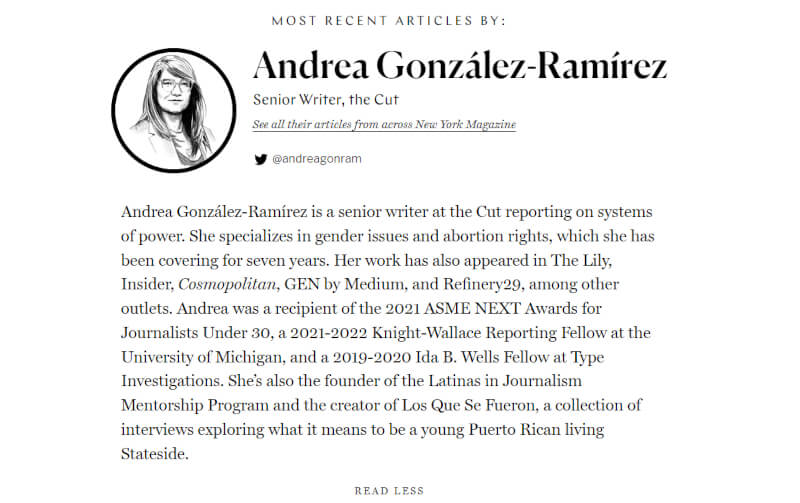
The Cut not only provides an overview of Andrea González-Ramírez‘s career and her Twitter profile for contact but also links to Andrea’s profile on New York Magazine, fully supporting E-E-A-T by giving readers the option to visit another outlet.
Additionally, like The Guardian (and others like The Verge, Vox, and The Globe and Mail), The Cut offers a one-line summary below the article’s title:

The Globe and Mail

In the case of The Globe and Mail, we see the opposite of previous examples: the author’s page exceeds 500 words and provides a detailed description of the journalist’s career. And I think it’s a good decision since these are international politics topics that require credibility.
On the page, we can see the awards and recognitions they’ve received, books they’ve written, languages they speak, and their academic background. It also includes a first-person quote, sharing what led them to pursue journalism.
The Guardian

There are also examples not to follow, like The Guardian, which only publishes the writer’s Twitter profile. In my opinion, even though they can rely on their Domain Rating of 93, these are metrics outside of Google’s scope, and with so much competition in digital media, they’ll soon need to optimize their author profiles.
The Verge
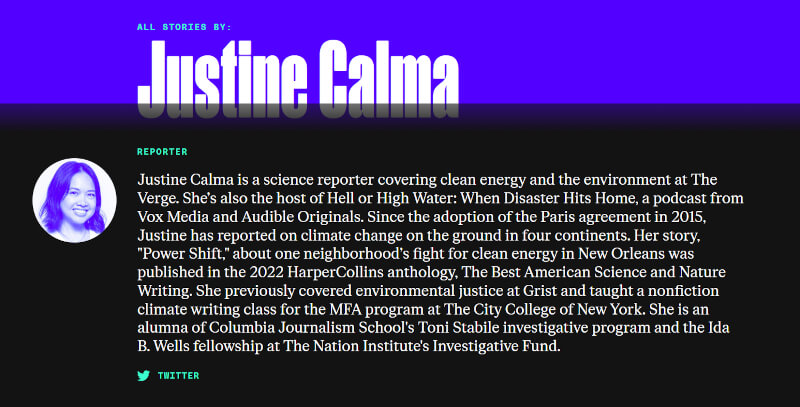
The Verge, a site that few SEOs haven’t visited after the famous article, also keeps author profiles in mind. The most notable thing is that Amanda Chicago Lewis, who wrote the article “The People Who Ruined the Internet,” has an unoptimized profile. Consistent with her opinion, I’ll give her a point for that.

YMYL Topics
VeryWell Fit

VeryWell Fit focuses on demonstrating E-E-A-T by offering a lot of relevant information about the people who write on the site. Among the data they provide on their background, work experience, academic history, and a first-person quote from the author with their thoughts on the world of nutrition stand out.
A very important point is that they offer access to the content review policies, to protect the readers’ health. They also present the profile of each member of the review board.
NerdWallet
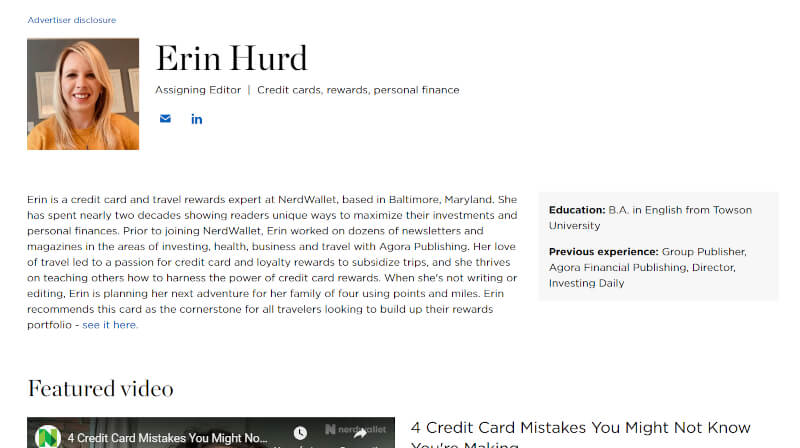
NerdWallet makes good use of the content published on its YouTube channel, sharing a featured video on the profile. It’s also interesting to see how they naturally distribute authority on the site, linking to a list of articles from other authors, mentioned as Erin’s recommendations.
Diet Doctor

One of the most complete examples we’ll see of author pages is DietDoctor. Two points to highlight: as I mentioned earlier, they include their license to practice medicine, and something that caught my attention—possible conflicts of interest with their work at the company.
GoCompare
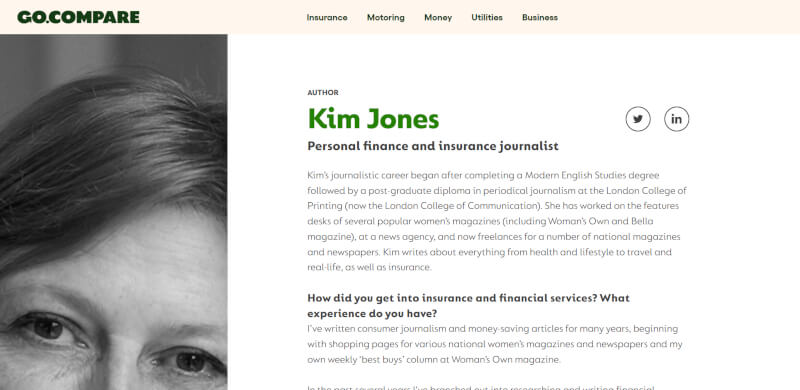
GoCompare offers an example that combines a classic third-person summary with a mini-interview where the author responds in their own words about their experience, awards, recognitions, and how they stay up to date in the industry.
SEO Authors
After seeing so many examples and reading articles about author pages, curiosity led me to see how the main sites in the SEO industry handle their author pages. I found some good examples to replicate on my page and those of some clients, and I also encountered a few surprises.
Marie Haynes
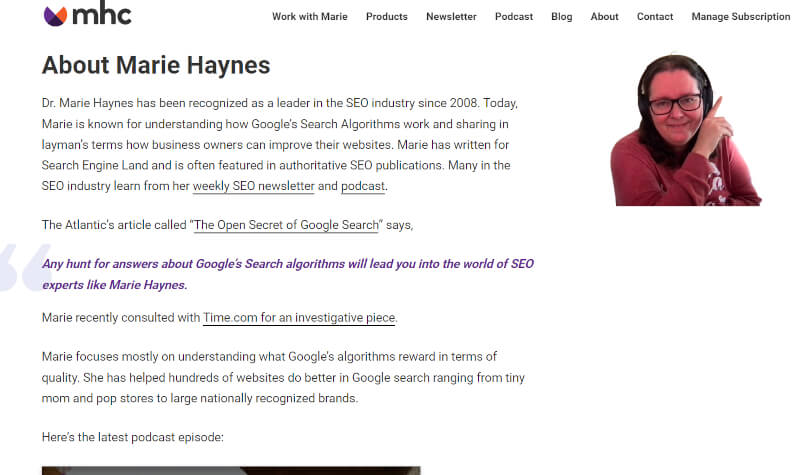
The highlight on Marie Haynes’ author page is a direct quote from The Atlantic, mentioning that “any search query about Google’s algorithms will lead you to people like Marie.”
Search Engine Land
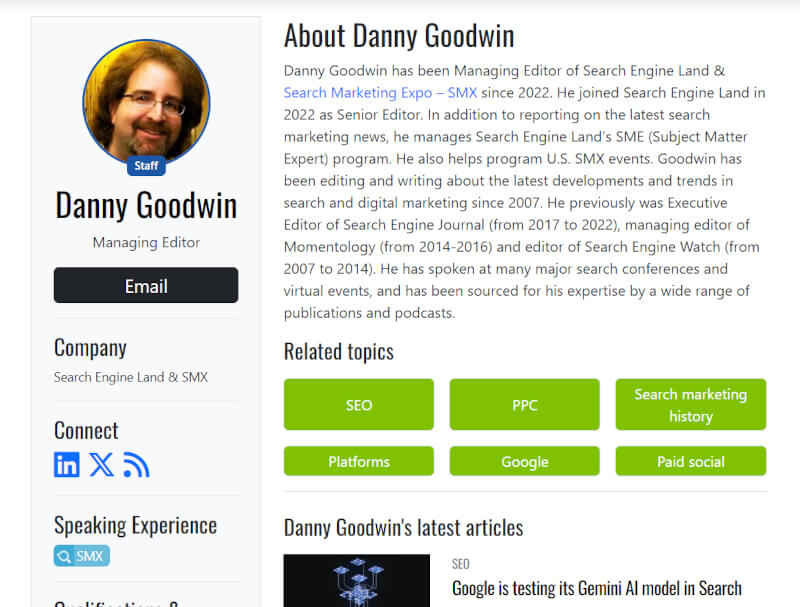
Danny Goodwin’s author page on Search Engine Land is a very comprehensive example to draw ideas from. I found it very useful how they link to category pages before moving on to the full list of articles written by Danny.
Search Engine Journal
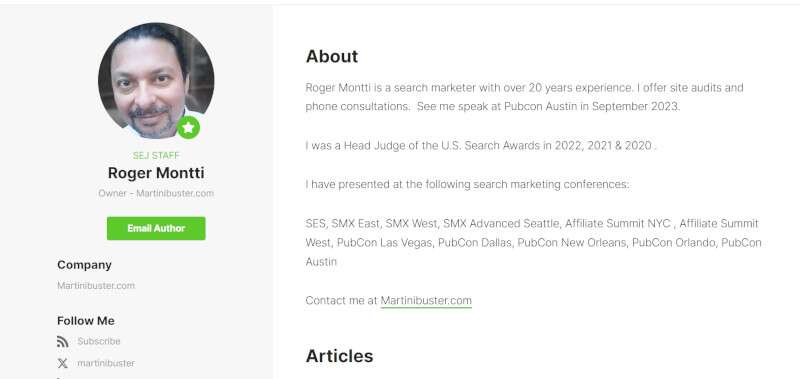
In SEJ’s case, we see a slightly less optimized author page, but it still includes the key points we’ve seen in the other examples. However, there was room for surprises…
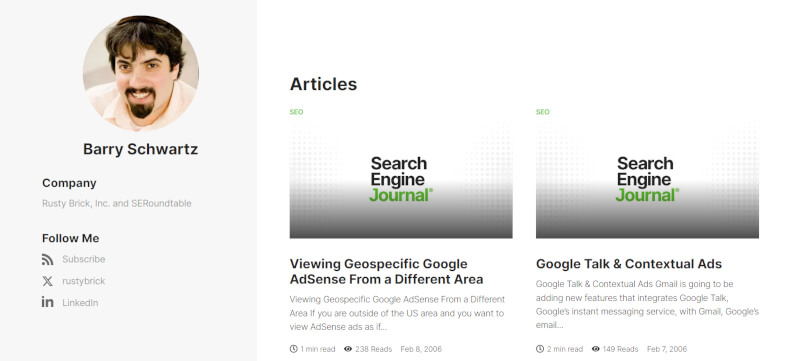
If an author is highly relevant in a topic, they can ignore having an optimized page, even doing the opposite of what they preach. This is the case with renowned Barry Schwartz: Do as I say, not as I do.
Search Engine Roundtable
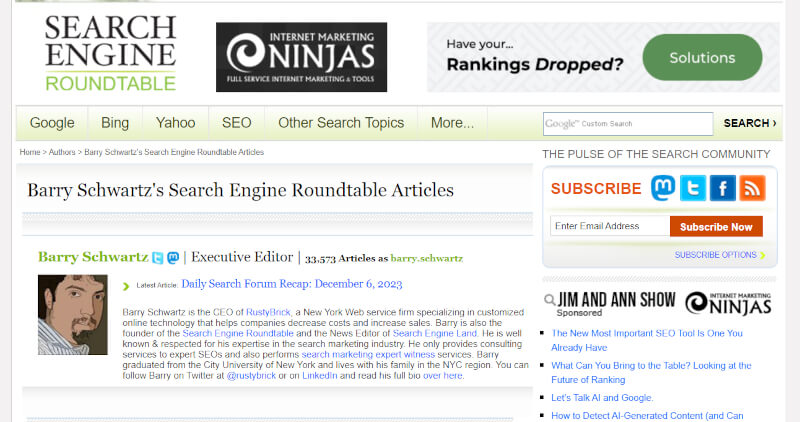
In this case, we see that our friend Barry does have an optimized author page on his own news site. The reason? I don’t have it, but I’d love to read your opinions in the comments.
Conclusions on Author Pages
In summary, the importance of a solid author page lies in its ability to boost your website’s E-E-A-T (Expertise, Experience, Authoritativeness, Trustworthiness). By addressing aspects such as third-person writing, concise biographies, role information, and including background and achievements, you’re building a bridge to the reader’s trust and validation by search engines.
From this detailed analysis, we’ve realized that our own author pages at MD Marketing Digital need a complete optimization. We recognize the importance of projecting a robust and trustworthy online image. For this reason, we are working hard to ensure our own author pages take the most important aspects of the examples we’ve shared with you.
Stay tuned for the ongoing transformations, as we aim to further elevate the credibility and reputation of our digital marketing blog. You’ll soon see the results of our continuous efforts!
- Author Pages: Strategies, Examples, and SEO Tips to Boost Your Digital Presence - December 20, 2023
¿Qué te pareció este artículo?
What do you think about this post?




